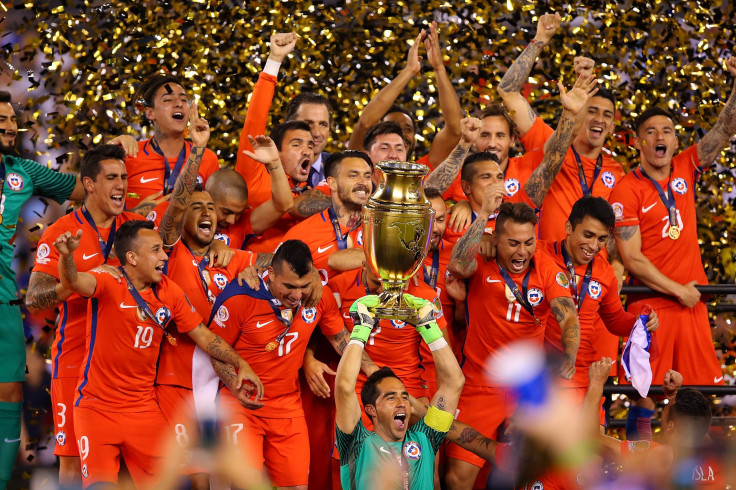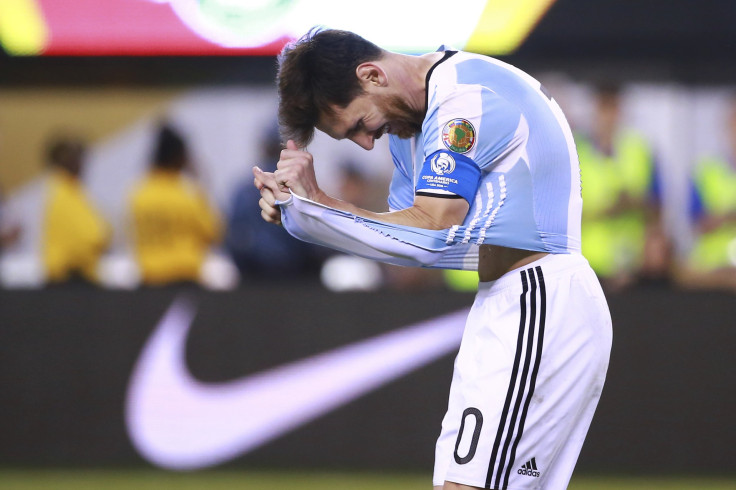VIDEO Copa America Final 2016: Chile Beats Argentina On Penalties Again As Messi Misses

EAST RUTHERFORD, N.J. — The pressure to end Argentina’s long wait for a senior title and deliver himself the international glory many feel he needs in order to be classed as the greatest player in history appeared to crushingly overwhelm Lionel Messi on Sunday in New Jersey. First he stepped up to take Argentina’s opening penalty in a shootout required to decide the Copa America Centenario final with Chile. But instead of leading from the front, he set a very different example as he sent his kick high over the bar and into the sky at a sold-out MetLife Stadium.
Minutes later, after teammate Lucas Biglia was denied by Claudio Bravo and Francisco Silva drilled home the winning penalty, Messi was in tears. For the second successive summer, following on from last year’s Copa America, Argentina had been beaten to the title by Chile after the agony of penalties. And it was the third summer in a row in which Argentina had tasted crushing final heartbreak, having lost the 2014 World Cup to an extra-time German goal.

Shortly after collecting himself to pick up yet another unwanted runners-up medal, his fourth, including the 2007 Copa America, Messi appeared in front of the world’s media to announce he could do no more.
“My thinking right now and thinking about it in the locker room, the national team is over form me,” the 29-year-old said. “It's been four finals, I tried my hardest. I want more than anyone to win a title for the national team, but it didn’t happen.”
Messi had gone into the game carrying the burden of attempting to end Argentina’s 23-year title drought and to finally, in the eyes of many, eclipse his legendary compatriot, Diego Maradona. He was also at the center of political unrest. After a delay to the team’s flight from Houston, where Argentina had swept aside tournament host the United States in the semifinals, Messi branded the Argentine Football Federation “a disaster.”
Then just two days before the final, FIFA announced it was effectively taking over the crisis-hit federation to steer it through new presidential elections. It remains to be seen to what degree Messi’s remarkable declaration was a considered decision, a spur of the moment emotion or a symbol of disillusionment with the AFA and a way to engineer change. But, in a fall of dominos that left Argentine soccer reeling, soon after Messi broke his news, teammates Sergio Aguero and Javier Mascherano seemingly followed suit.
The announcements would have shocked coach Gerardo Martino, who only minutes earlier sat in a press conference expressing his faith that all of his players would stay on.
“My impression is that they don't have any reason not to continue trying because they do it with a lot of honesty and a lot of effort and we are in the middle of very difficult World Cup qualifying,” he said. “Our players have competed very well, made it to the final once again. They should have won the final. None of what happened in the political arena has had any influence on our ability to play well again.”
Whether those players reverse their decisions or not, it would be hard not to think that this generation’s best chance to win a senior title has now been and gone. For a group of players, many of whom had come up through the youth ranks together, winning back-to-back Under 20 World Cups as well as Olympic gold in 2008 and now in their prime, this was supposed to finally be their moment.
And this was supposed to be Messi’s moment. The five-time Ballon d’Or winner had been made the scapegoat back home last summer after he again failed to produce the same extraordinary level Argentines had become accustomed to seeing him deliver in a Barcelona shirt when it really counted for his country.
Unlike the climax to last year’s Copa America and the World Cup, Messi appeared fresh and in form in the latter stages of this specially arranged competition to celebrate the centenary of South America’s championship.
A pre-tournament back injury had meant Messi didn’t make his first start in the competition until the quarterfinal. And in his limited time on the pitch, he made his presence felt. After scoring a hat-trick off the bench against Panama, Messi equaled Gabriel Batistuta’s all-time scoring record for Argentina in the quarterfinals against Venezuela. Then in a 4-0 semifinal rout of the U.S. he fired his 55th goal to take Argentina’s record outright with a sensational free-kick.
On Sunday, in the closing minutes of extra time, Messi stepped up to a free-kick in almost the exact same position as he found the net against the U.S. It appeared the stage was set. Just one glorious kick to deliver Argentina the trophy and put the last of Messi's critics to rest. This time, however, his effort found only the top of the Chilean wall.
Still, once again, it would be ludicrously harsh to put the blame for defeat on Messi’s shoulders. For 120 minutes, he was Argentina’s best hope of breaking the deadlock. And it not been for Messi's profile ensuring he would be the focus of attention, it would surely have been teammate Gonzalo Higuain carrying the brunt of responsibility.
Fresh from a record-breaking season in Serie A with Napoli, the striker looked to be in form to finally silence his own critics for his country. Yet, just as in the World Cup final and the 2015 Copa America final, he missed a clear-cut chance, this time dinking over the goalkeeper but wide of the post when clean through on goal after a defensive disaster from Chile’s Gary Medel.
Shortly after that 21st minute miss, it was not Higuain, not Messi, or indeed any other player, who grabbed the spotlight, but instead the man with the whistle.
Brazilian referee Heber Lopes came into the match with a disciplinary record that promised trouble, and he duly delivered. Having already, correctly, booked Chile’s Marcelo Diaz for bringing down Messi, just before the half-hour mark he brandished the midfielder with his second yellow. This time, though, Diaz had seemingly been powerless to prevent contact as Messi knocked the ball past and then careered into him. It seemed the referee had been swayed by Argentine protests as he pulled the cards form his pocket.
It was only to get worse from there. Next came a booking for Messi after he went down in the box following a collision with Juan Fuenzalida. It wasn’t a penalty, but also not a dive. And again the card only arrived after protests from opposition players. The referee, who let challenges rain in early on, had lost control and the result was the spoiling of what had been a hugely promising final.
Before the half was out, Lopes had evened up the numbers. This time it was a harsh straight red for Argentina defender Marcos Rojo after the Manchester United defender went in firmly on Arturo Vidal.
While the removal of a man on each side can often open a game up, on this occasion, at the climax of a major tournament and at the climax of a grueling season, it brought caution and heavy legs.
For Chile, it meant its trademark pressing was far less furious and instead gave way to a preparedness to sit back and wait for its opportunities on the break. After Chile dropped a man back to cope with Diaz’s sending off, Argentina followed suit by taking off Angel di Maria and bringing on defensive midfielder Matias Kranevitter. It was caution from Martino that was arguably excessive.
Argentina struggled to find a way through Chile’s well-drilled backline. When opportunities did arise they came from the individual invention of Messi. But the finishing from those around him continued to be less than exemplary.
Five minutes from the end, a trademark burst of acceleration from Messi opened up space for him to fed Aguero. But the Manchester City striker replicated the man he had not long since replaced, Higuain, with a wayward finish.
As the 90 minutes ticked into injury time, one last burst of energy arrived. In the Argentina penalty area, Ramiro Funes Mori came up with a superb, goal-saving block to deny Alexis Sanchez, largely subdued on the night, but who would later pick up the award for player of the tournament. Immediately sensing open space, Messi soared forward toward the other end, skipping past challenges with his mesmeric footwork. On this occasion, however, unlike some of the brilliant goals that have enshrined him as the greatest player of his generation, when it came to the finish he too was off-key.
Chances to prevent a second goalless final in 12 months between the two sides came and went at both ends in extra time. Eduardo Vargas failed to make the most of a free header eight yards out before Bravo made a spectacular diving intervention to keep out a looping header from Aguero.
It meant penalties once more and another triumph for Chile. After 99 years of competing in senior international tournaments without winning a single one, Chile has now one back-to back crowns, adding the special one-off trophy to the regular Copa America so joyously won on home soil 12 months ago. There can be no doubting that, even with hugely influential coach Jorge Sampaoli being replaced by Juan Antonio Pizzi, Chile are now a true global power.
And in the eyes of Pizzi, himself an Argentine by birth, despite failure once again on the international stage, there remains no doubt of Messi's place in the pantheon of the sport.
“People are sometimes very particular about what they value,” Pizzi, who only took charge of Chile in January, said. “From my point of view, I believe that Messi is the best player in history, maybe for my generation we’re not able to compare him to Maradona because of what he did for Argentine football, but I do think he’s the best player in history and I think that the numbers are irrefutable.”
© Copyright IBTimes 2025. All rights reserved.





















